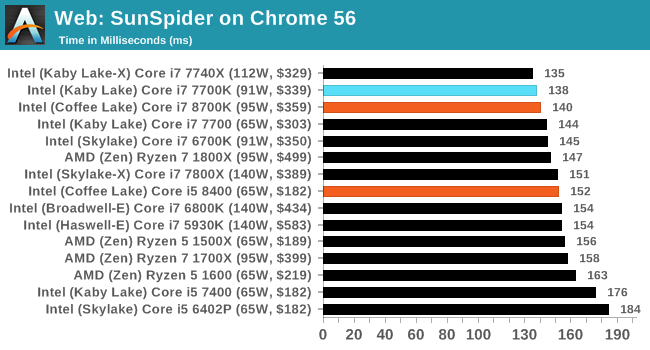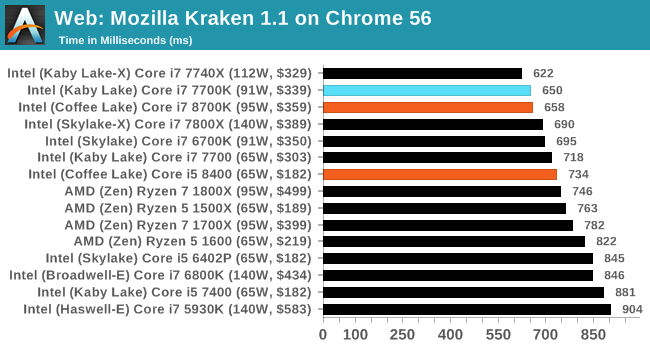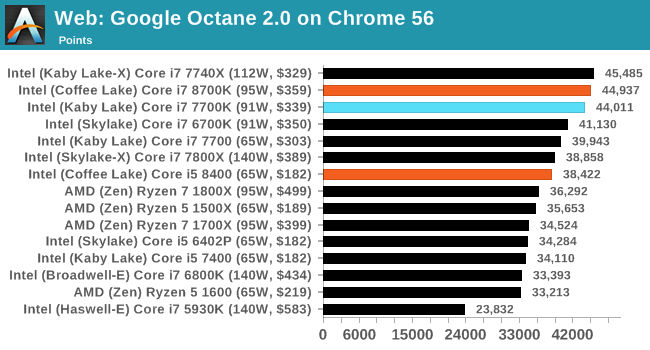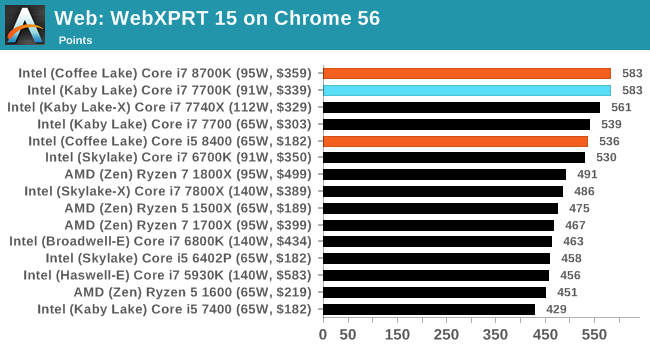The AnandTech Coffee Lake Review: Initial Numbers on the Core i7-8700K and Core i5-8400
by Ian Cutress on October 5, 2017 9:00 AM EST- Posted in
- CPUs
- Intel
- Core i5
- Core i7
- Core i3
- 14nm
- Coffee Lake
- 14++
- Hex-Core
- Hyperthreading
Benchmarking Performance: CPU Web Tests
One of the issues when running web-based tests is the nature of modern browsers to automatically install updates. This means any sustained period of benchmarking will invariably fall foul of the 'it's updated beyond the state of comparison' rule, especially when browsers will update if you give them half a second to think about it. Despite this, we were able to find a series of commands to create an un-updatable version of Chrome 56 for our 2017 test suite. While this means we might not be on the bleeding edge of the latest browser, it makes the scores between CPUs comparable.
All of our benchmark results can also be found in our benchmark engine, Bench.
SunSpider 1.0.2: link
The oldest web-based benchmark in this portion of our test is SunSpider. This is a very basic javascript algorithm tool, and ends up being more a measure of IPC and latency than anything else, with most high-performance CPUs scoring around about the same. The basic test is looped 10 times and the average taken. We run the basic test 4 times.

Mozilla Kraken 1.1: link
Kraken is another Javascript based benchmark, using the same test harness as SunSpider, but focusing on more stringent real-world use cases and libraries, such as audio processing and image filters. Again, the basic test is looped ten times, and we run the basic test four times.

Google Octane 2.0: link
Along with Mozilla, as Google is a major browser developer, having peak JS performance is typically a critical asset when comparing against the other OS developers. In the same way that SunSpider is a very early JS benchmark, and Kraken is a bit newer, Octane aims to be more relevant to real workloads, especially in power constrained devices such as smartphones and tablets.

WebXPRT 2015: link
While the previous three benchmarks do calculations in the background and represent a score, WebXPRT is designed to be a better interpretation of visual workloads that a professional user might have, such as browser based applications, graphing, image editing, sort/analysis, scientific analysis and financial tools.











222 Comments
View All Comments
DigitalFreak - Thursday, October 5, 2017 - link
Anyone having an issue with Bench? I'm trying to compare my i7-3770k to the i7-8700k and it comes back with no data. Same with trying the Threadripper 1920xmkaibear - Friday, October 6, 2017 - link
CPU tests changed so benchmarks weren't comparable. Latest processor tested on the old tests was the 7700K iirc, and not everything is tested on the new tests.I'd compare results for the 3770k and the 2600K to get a baseline then you can compare 2600K to the 8700K. It's a bit fiddly, I have to do the same with my 4790K.
Ian Cutress - Saturday, October 7, 2017 - link
We updated our CPU testing suite for Windows 10 in Q1. Regression testing is an on-going process, though it's been slow because of all the CPU launches this year. Normally we have 1/2 a year. We're so far at what, 6 or 7 for 2017?mczak - Thursday, October 5, 2017 - link
Doesn't look to me like the die size actually increased at all due to the increased gate pitch.The calculations in the article forgot to account for the increase of the unused area (at the bottom left) - this area is tiny with 2c die, but increases with each 2 cores added significantly. By the looks of it, that unused area would have grown by about 2 mm^2 or so going from 4 to 6 cores, albeit I'm too lazy to count the pixels...
jjj - Thursday, October 5, 2017 - link
Your conclusion is weirdest thing ever, you fully ignore the 8359k and AMD.In retail, the 8350k will do very very well and retail is what matters for most readers
And ignoring AMD is not ok at all, it's like you think that we are all idiots that buy on brand.You do think that, your system guides make that very clear but you should not accept, support and endorse such an idiotic behavior.
AMD got hit hard here, Intel takes back the lead and it's important to state that. Sure they might have Pinnacle Ridge in a few months and take back the lead but buyers that can't wait should go with Intel right now, for the most part. AMD could also adjust prices ofc.
Tigris - Thursday, October 5, 2017 - link
Really confused why the pricing listed in this review isn't consistent- for Intel you were posting prices you found online, but for Ryzen you appear to be posting MSRP.The truth is- you can find 1700x for $298 right now EASILY (Amazon), yet Microcenter is selling the 8700k for $499.
If you factor this information in, the AMD solutions are still far more valuable per dollar.
wolfemane - Thursday, October 5, 2017 - link
I really can’t belive the amount of flak Anandtech takes these days. I find it un-earned an unwarrented. Out of all the tech sites and forums I manage to read in a given week, Anandtech is the most often quoted and linked to. Hell I use it as my go to for reference and comparison (and general reading). My only big complaint is your ads, and I’d gladly pay a sub to completely remove that nonsense and directly support the site!Ian, you and your staff deserve far more credit than you get and that’s an injustice. Each piece is pretty thorough and pretty spot on. So for that thank you very much.
This article is no exception to the rule and is superb. Your graph layouts are a welcome feature!!!!! I look forward to your ever expanding tests as new chips roll in. I think the 8600k is going to be a game changer in the i5 vs i7 performance category for these hexacore cpus. I think that’s why almost all the reviews I’m reading today are with the 8700k and 8400.
Agin, thank you and your staff very much for the work you put into publishing amazing articles!!
vanilla_gorilla - Thursday, October 5, 2017 - link
Personally I buy whatever is best at the time. Right now I'm typing this on a 1700x and I can see a 4770k build on the desk next to me. So it's always funny to see the bias. Intel review gets posted, AMD fanboys come out of the wood works to trash them as paid shills. But it works exactly the same on any positive AMD reviews. Intel fans come in trashing them. It's really odd. Anandtech is one of the most unbiased sites I've found and I trust their reviews implicitly.mkaibear - Saturday, October 7, 2017 - link
> Anandtech is one of the most unbiased sites I've found and I trust their reviews implicitly.Yep. Anyone who looks at AT and sees bias needs to examine their own eyesight.
SeannyB - Thursday, October 5, 2017 - link
For the H.264 encoding tests, you could consider using the "medium" preset or better. The "very fast" preset has a tendency to use fewer cores.